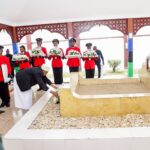In an impassioned address to the citizens of Bahi District, the Vice President of the United Republic of Tanzania, Hon. Dr. Philip Mpango, underscored the paramount importance of conserving water sources to guarantee the long-term sustainability of clean and safe water provision. This appeal to action is made at a time when the issue of water security is becoming increasingly prominent on the global agenda, and Tanzania is no exception to this trend.
During his visit to the Dodoma region, Dr. Mpango presided over the inauguration of the Ibihwa Water Project, a significant initiative aimed at enhancing water accessibility in the region. This project serves as both an exemplar of the government’s dedication to enhancing water infrastructure and a reminder of the collective responsibility required to maintain and protect these vital resources.
The Importance of Water Source Preservation
Access to water is a fundamental human need, and its availability is crucial for the health and well-being of any community. In Tanzania, where agriculture represents a significant component of the national economy, access to water is of paramount importance. However, the sustainability of water sources is threatened by a number of factors, including deforestation, climate change and population growth. In light of these challenges, it is imperative to implement proactive measures to ensure the long-term sustainability of water resources for future generations.
Dr. Mpango’s appeal to the citizens of Bahi District emphasises the necessity for community involvement in water conservation initiatives. Furthermore, he emphasised the considerable input required to maintain water sources, urging all citizens to recognise their role in this vital undertaking. The Vice President’s message is unambiguous: the preservation of water sources is not the sole responsibility of the government, but rather a collective obligation that encompasses all members of society.
The Role of Tree Planting in Water Conservation
One of the principal strategies proposed by Dr. Mpango is the planting of trees, with a particular focus on those that are beneficial to water sources. Trees play a pivotal role in the hydrological cycle, facilitating the maintenance of soil moisture, the reduction of erosion, and the enhancement of groundwater recharge. The planting of trees can facilitate the creation of a sustainable environment that supports water conservation at the community level.
Dr. Mpango recommended that regional and district leaders disseminate information to the population on the significance of tree planting, particularly during the rainy season when conditions are optimal for tree growth. This initiative has the dual benefit of assisting with water conservation and combating climate change. Trees play a crucial role in this process, as they absorb carbon dioxide and release oxygen.
Collaborative Efforts for Water Harvesting
Furthermore, Dr. Mpango advocated for a collaborative approach between the Irrigation Commission and the Ministry of Livestock, with the objective of constructing dams for water harvesting. Such dams are vital for the capture of precipitation, which can then be employed for the purposes of irrigated agriculture, livestock husbandry and human consumption. By investing in water harvesting infrastructure, Tanzania can enhance its water security and support agricultural productivity, which is vital for food security and economic growth.
Furthermore, the construction of dams serves to mitigate the effects of climate change, which has resulted in erratic rainfall patterns. The storage of water during periods of heavy rainfall allows communities to ensure a consistent supply during dry spells, thereby mitigating the adverse effects of droughts.
A Vision for Sustainable Water Management
Dr. Mpango’s visit to Bahi District and the inauguration of the Ibihwa Water Project exemplify a more expansive vision for sustainable water management in Tanzania. This vision is grounded in the recognition that water is a shared resource that necessitates collective stewardship. This approach necessitates the implementation of integrated strategies, whereby government agencies, local communities, and other pertinent stakeholders collaborate to ensure the effective protection and management of water resources.
The Vice President’s emphasis on the importance of education and community involvement is particularly noteworthy. By fostering awareness of the significance of water conservation and the function of tree planting, the government is enabling citizens to engage in action. This bottom-up approach is of paramount importance for the creation of a culture of sustainability and the guarantee that water resources will be preserved for future generations.
Vice President Dr. Philip Mpango’s Transformative Visit to Dodoma: Inaugurations and Foundations for Future Growth
On 20 August 2024, the Vice President of the United Republic of Tanzania, Hon. Dr. Philip Mpango, commenced a substantial working visit to the Dodoma region, signifying a day of considerable achievements and forward-thinking initiatives. The visit served to illustrate the government’s commitment to the enhancement of educational infrastructure and the stimulation of agricultural and industrial development in the region.
Inauguration of Kimaghai Secondary School “A”
The Vice President’s itinerary commenced with the inauguration of Kimaghai Secondary School “A” in Mpwapwa District. This newly established educational institution is poised to become a pivotal force within the community, offering quality education and fostering a conducive learning environment for the younger generation.
The establishment of the school is in accordance with the government’s broader educational objectives, which are to increase access to education and to improve learning outcomes across the nation.
In his address at the inauguration ceremony, Dr. Mpango underscored the pivotal role of education as a foundation for national development. Furthermore, he emphasised the government’s commitment to investing in educational infrastructure, with the objective of ensuring that students in rural areas have the same opportunities as those in urban centres.
Furthermore, the Vice President exhorted local leaders and educators to uphold the highest standards of education and to inspire students to achieve academic excellence.
Laying the Foundation for Agricultural Innovation
Subsequent to the inauguration, Dr. Mpango proceeded to Mtanana in Kongwa District, where he presided over the laying of the foundation stone for the Smart Cereal Crop Management Centre. This initiative represents a significant advance in the modernisation of agricultural practices in the region. The centre is intended to serve as a focal point for research, training and the dissemination of innovative farming techniques, with a particular emphasis on cereal crop management.
The Smart Cereal Crop Management Centre will facilitate access for farmers to the latest agricultural technologies and practices, thereby enhancing productivity and sustainability. By concentrating on the concept of smart agriculture, the centre seeks to confront challenges associated with climate change, pest management and soil fertility, thereby contributing to the enhancement of food security and economic growth in the region.
In his address, Dr. Mpango emphasised the pivotal role of agriculture in Tanzania’s economy and the necessity for unceasing innovation to enhance yields and improve livelihoods. He encouraged farmers to adopt new technologies and practices that would facilitate increased production and enable them to compete effectively in both local and international markets.
Foundation Stone for the Grape Processing Factory
The visit of the Vice President was brought to a conclusion with the laying of the foundation stone for the Grape Processing Factory in the Chinangali II District of Chamwino. The project is positioned to effect a transformation of the local grape industry, providing a facility for the processing of grapes into a range of products, including wine and juice. It is anticipated that the factory will result in the creation of employment opportunities, the stimulation of local economies, and the opening of new markets for Tanzanian grape products.
Dr. Mpango emphasised the importance of value addition in agriculture, noting that the processing of raw materials into finished products can significantly enhance economic returns and create employment opportunities. He encouraged local farmers to increase grape production and assured them of the government’s support in accessing markets and improving production techniques.
In conclusion, as Tanzania continues to develop and face new challenges, it is of the utmost importance to preserve its water sources. Dr. Philip Mpango’s appeal for action serves to emphasise the collective responsibility that we all bear in safeguarding this invaluable resource. By collectively implementing initiatives such as tree planting, the construction of water harvesting infrastructure, and community education, Tanzania can ensure the long-term sustainability of its water resources.
The Ibihwa Water Project represents a promising initiative, yet it constitutes merely the initial phase of a larger endeavour. It is incumbent upon all citizens, leaders, and stakeholders to heed the Vice President’s call and commit to the preservation of water sources for the benefit of all. In doing so, Tanzania can construct a future in which clean and safe water is accessible to all, thereby supporting the health, prosperity, and resilience of its people.
The Vice President’s visit to the Dodoma region was characterised by a series of strategic initiatives that serve to illustrate the government’s commitment to the advancement of education, agriculture and industrial development. The inauguration of Kimaghai Secondary School “A” and the laying of the foundation stones for the Smart Cereal Crop Management Centre and the Grape Processing Factory represent significant investments in the region’s future.
It is anticipated that these projects will facilitate transformative changes, enhancing educational access, boosting agricultural productivity, and fostering industrial growth. As Tanzania progresses along its trajectory of development, such initiatives are of paramount importance in ensuring sustainable growth and enhancing the quality of life for its citizens.
Dr. Mpango’s visit serves to illustrate the importance of strategic planning and investment in key sectors as a means of driving national progress. The Dodoma region, with its considerable potential, stands to benefit considerably from these developments, thereby paving the way for a brighter and more prosperous future for its residents.
Tanzania Media
- Kanyala Ferry Launch: TEMESA’s New Service for 15,000 Sengerema Residents (Mwanza) - 18 August 2025
- Russia-Tanzania Naval Cooperation: How the Smolny Training Ship Boosts Dar es Salaam’s Maritime Security - 18 August 2025
- Tanzania’s ICGLR Commitment: Stabilising the DRC & Great Lakes Region - 18 August 2025







































